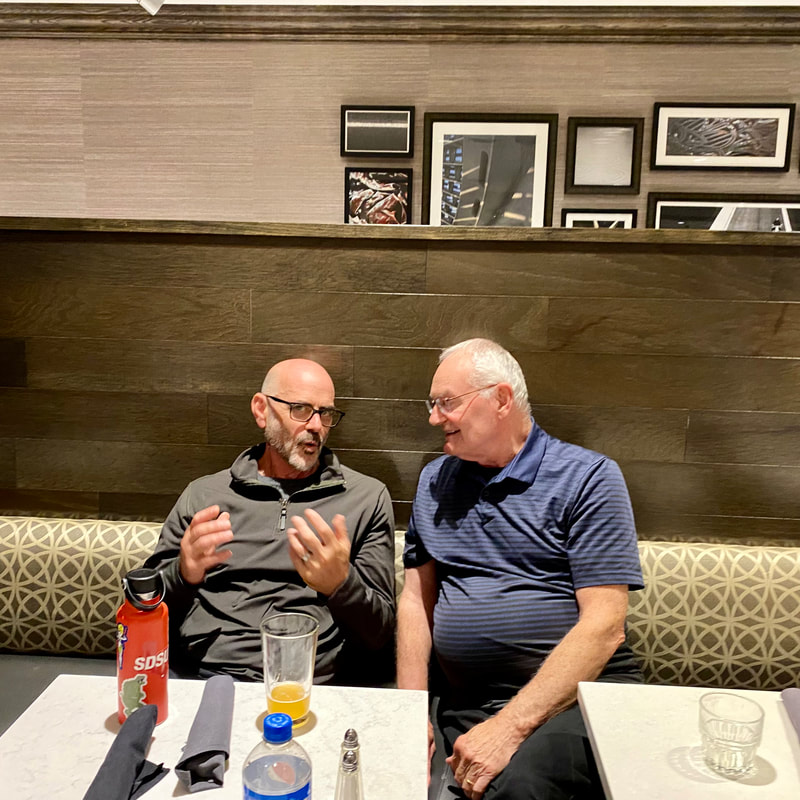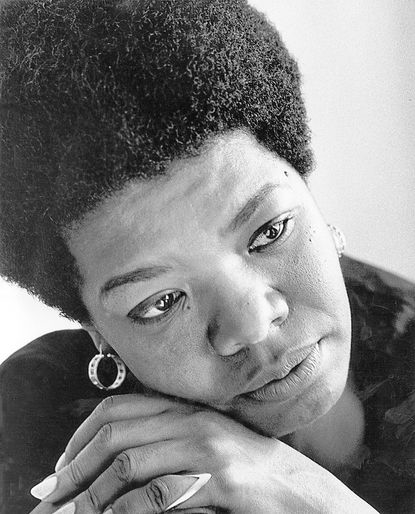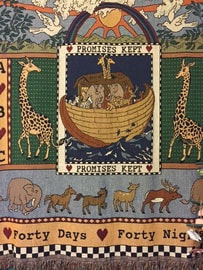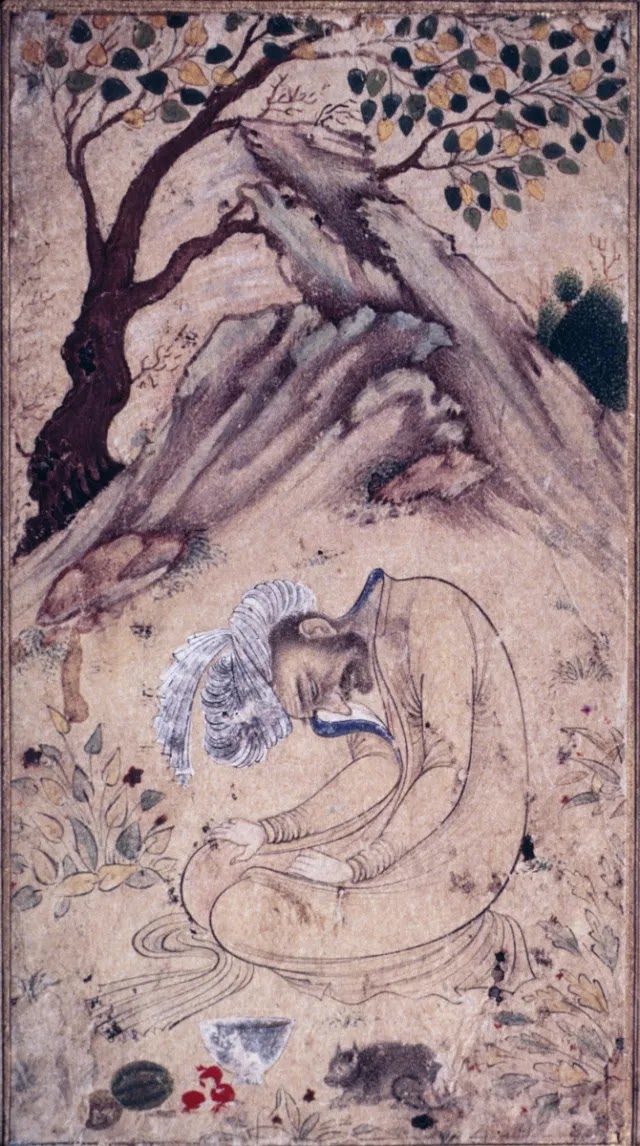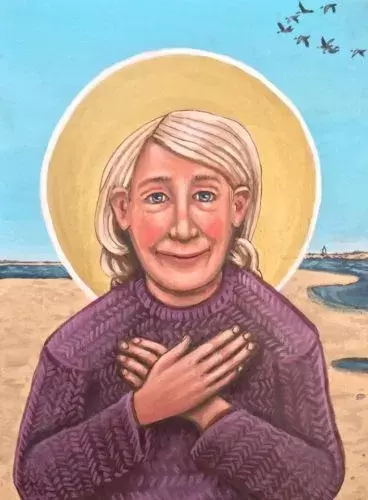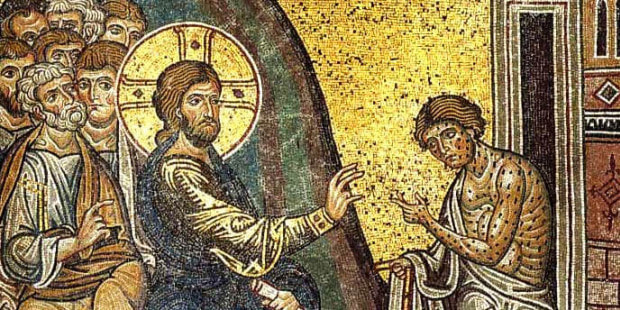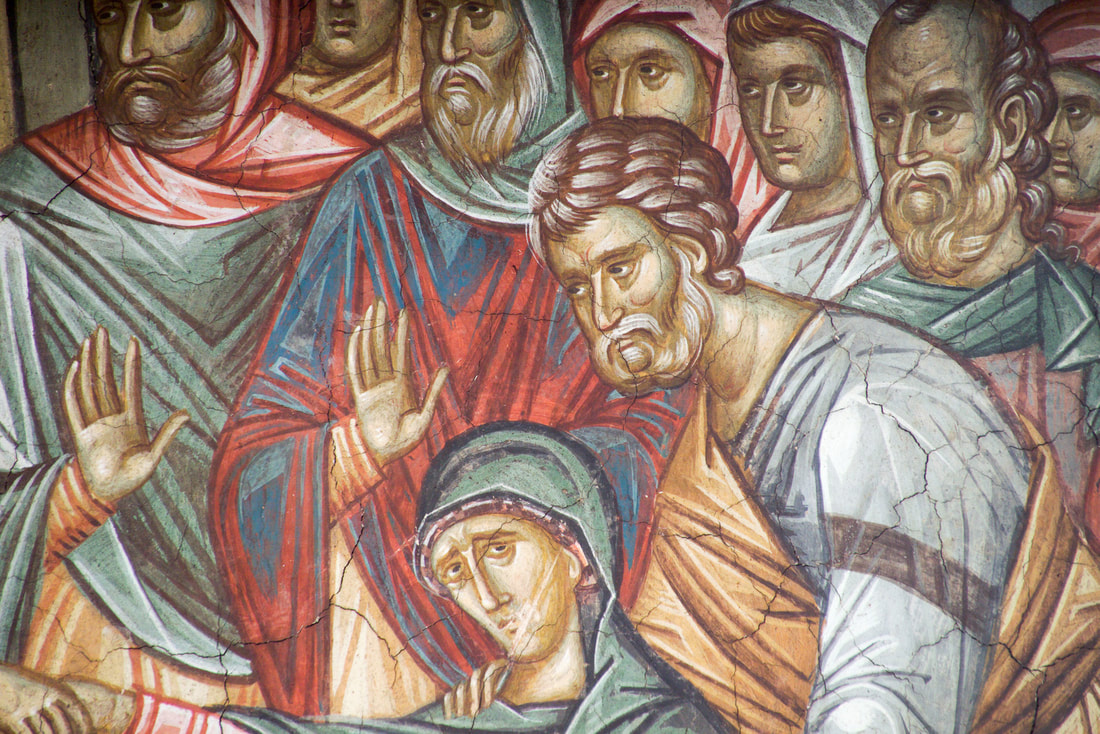The blessing and promise that God gives Abraham, are the same God has given to us so that we can be what we’re destined to be - God’s beloved children.
When our first child was due, whimsy storybook names like Ruby and Daisy were trending. But we wanted something that meant something, and that spoke to our heritage. In Gaelic, Fiona means “fair” – not as judicial but pail, like skin. And when she was born, we had no idea about the movie Shrek that had just come out. Otherwise, we probably wouldn’t have named her after an ogre.
For Colleen, we thought it through a little better. We wanted a strong name that would endure time. We knew we were having a girl so we named her Colleen which is an Irish name that means “girl.” It’s a great name in my opinion, but little did I realize it’s only a few letters different than her mother’s name; adding to the growing list of things that mess me up in life. When Sean was born, we already had a long list of names we agreed on. But once we met him, none seem to fit. In a rush to get the paperwork filled out before leaving the hospital, we agreed to call him Sean – a Celtic variation of John, like Ian is in Gaelic. John mean’s God’s great gift. Enough said. Our birth names aren’t the only names that define us. Sometimes we go by our relationships and titles. I’ve been called son, husband, padre, and of course reverend. Since names are given to us at our birth, we don’t really have a say in the matter. So, it’s not uncommon for people to change their names. Some actors take a new stage name for practical reasons - it’s too long, or too hard to say, or someone else already has it. For others it’s to give them a new persona, like going from Norma Jean to Marilyn Monroe. I had a friend Darrell who change his name. I have no idea why. He’s not a celebrity or famous for anything. All I know is one day everyone just starting calling him Rick. This might have made more sense if he was the pope or someone entering a religious order where it’s commonplace to take a new name to signify their new status and new purpose. Which takes us to our reading today from Genesis 17:1-7.
watch the message here
This is just one of many stories in Genesis that describe the covenant between God and Abram. In each one the terms are graciously lopsided. Like we learned last week with Noah, God is the giver. All Abram has to do is be himself. After all, God’s covenants do not rely on our faithfulness, only God’s.
Now, the gist of this story is simple. God has big plans for reconciling the world. Plans that include some unlikely characters. Like the aging Abram who God promises to make the father of many nations. When Abram hears this he doesn’t run away or come up with some excuses as to why he’s unsuitable for the task. I suspect there’s some snickering and eye-rolling though. Who could blame him? He and his wife are in their nineties. Not the ideal time to be having babies. This year my dad will turn 90. The idea of having a new brother or sister seems highly unlikely. But then again, what we think is a handicap God sees as an opportunity to show off what God can do. To me, the most interesting aspect of this story is how everyone gets a new name; starting with God who is now called El Shaddai, which is often translated from the Hebrew as “God Almighty.” It’s not so much a name but a definition of God’s character. In using this word to describe God, the author speaks of God as the ultimate Creator, Redeemer, and Sustainer of all things. This is what God does. Next is Abram, whose name means “exalted ancestor.” He becomes Abraham, “ancestor of a multitude.” It’s a subtle difference with huge implications. He will not just bear a son to carry on his name, but his name will be the DNA of God’s graciousness among the nations. His wife, Sarai, is also the recipient of God’s blessing. She becomes Sarah, which means “princess.” She is the one who will carry the promise of this royal covenant to life. These changes sound subtle, but they are profound in the way they define God’s promise as their stories play out. My dear friend Dowan taught me that when a baby is born in Korea, he or she is given a name that reflects not only the child’s character but destiny as well. This seems to be the case when God names Abraham and Sarah. Blessed by God in this naming, their destiny is guaranteed. Tied to God in this covenant, they are recipients of God’s steadfast love and grace. A promise which God passes down to their heirs who will be more numerous than the stars in the sky. Just the other day I saw one of the first images taken on Mars by the rover Perseverance. While it was fascinating to see what the landscape was like, my attention was drawn to the vastness of the heavens and countless number of stars that surrounded the Red planet. Let’s just say there were too many to count. And that’s just in our galaxy. There are dozens if not hundreds more galaxies out there. I imagine Abraham and Sarah looking up in the sky and just trying to imagine the possibility of giving birth to such a large clan. But with every silvery glimmer, each twinkling light, God’s promise is remembered as they cling to hope knowing God’s word is good. And God delivers. They become the grandparents of a new generation blessed by God. From their lineal offspring will arise the Suffering Servant who will “bring forth justice to the nations” (Is 42:1). From this new family, Jesus will be born. He will be given a new name – a name above all others. Through him the covenant continues to bless us today. Which brings us to why this is an important story to read during Lent as we walk with Jesus from the wilderness to the cross. Whether or not he knew of the great Easter promise, Jesus knew of this covenant. He lived and ministered with faithfulness knowing the power of God’s word, just as his ancestor Abraham had thousands of years before. It was knowing God’s word is good that allowed the people of Israel to cling to hope when all seemed hopeless. It was knowing God’s word is good that the new church was able to survive the brutality of the Roman Empire. It was knowing God’s word is good that has allowed countless saints before us stand firm in their faith in the one who remains faithful no matter what humans try to do to change that. It’s knowing God’s word is good that allows us today to get through the challenges we face in life. What God said then, God means now. God’s word is good, even when we aren’t. As we walk with Christ, let us remember that he too received a new name. And with it, his destiny was set. You might remember that when he arose from the waters of his baptism, the spirit of God declared: ‘You are my Son, the Beloved; with you I am well pleased.” No longer was he Jesus of Nazareth, no longer was he the carpenter’s kid, he was now named and claimed by his God to be the Beloved. It was more than a name change, it was a calling, a direction by which Jesus’ entire ministry would be founded on. Being the Beloved. With his new name and new purpose, Jesus would become the visible presence of God’s heart in the world. Which brings me to you and me, and anyone who takes the name Christian. Our mission is to continue Jesus’ mission - to go out into the world to teach and heal and welcome others into the family of God. No matter what name is written on your birth certificate, at your baptism God has named and claimed you for this purpose. We are beloved children of God, heirs to divine glory and everlasting life. Because of our faith in Christ, we share his name. And we share his glory. Through Jesus, God calls us to be the Beloved. More than a name, it’s our destiny. This is what it means to make God our God, and to be God’s beloved people. It is our job now to be little Christ in the world so that others may come to understand God’s glory in the way we live into our love for one another; sharing our gifts, building bridges and creating communities of peace in God’s name. For most of us, faith is a hard journey. One that often causes us to stumble. But remember what God is able to do with people like us. The blessing and promise that God gives Abraham, are the same God has given to us so that we can be what we’re destined to be - God’s beloved children. We are heirs to the covenant of God’s grace which has been passed down through the ages, never altered or voided. God remains faithful to God’s own promise. It’s impossible for God to do anything less. As we move through Lent, I would like to share the words of Barbara Brown Taylor who reminds us that “We don’t just move to Easter from the shopping malls and spa. We are given a gift of time, 40 days to be exact, to examine who we are in our own covenant with God.” Lent is an invitation to take an honest look at what that relationship looks like, and what purpose it might signify as you move to bring God’s righteousness into a world hungry for love and justice. It’s a time to remember that God is calling you by your name – beloved. As Jesus illustrated in all the ways he cared for people, this name is not just a personal noun. It’s a call to action. So as you leave here today, I invite you to go and be the love of God that was made known to us in Jesus. Remembering always, that his name is your name. His purpose is your purpose. His glory is yours too, if you want it. Work Cited Bartlett, David L. and Barbara Brown Taylor, eds. Feasting on the Word, Year B Vol 2. (Louisville: Westminster John Knox, 2008).
0 Comments
When he opened the door my mom asked him, "What the hell do you think you are doing?"
"I'm going to deliver the baby," my dad replied. After all, he as a pediatrician and had delivered hundreds of babies in his fairly young practice. It was there in the stillness of the night a voice yelled out into the darkness, "The hell you are. You're wearing a new shirt." Summoning all the wisdom of the ages, my father closed the door to the Beetle, and drove away towards Morton Plant Hospital where I was pretty popping out by the time my mom was placed on the gurney. My dad's shirt remained crisp and clean for the remainder of the night. Knowing him, that was as long as it would. I like to think this experience is what made me to be who I am. Although, I'm not so sure. But one can pretend that the reason I love jumping into things so quickly is because I couldn't wait to give this thing called life a try. Now, I can say with most certainty, I am glad I did. I've been told a lot that my dad's only regret in life is that he didn't get to deliver one of his children. As he often reminds me, "Never argue with the woman who is giving birth to your children." I don't often celebrate my birthday, but today I can truly say, I am forever grateful for my birth. The reason I am writing this today is because I read something from Henri Nouwen who helped me to better understand birthdays, and the reason we ought to celebrate them. He wrote, “Birthdays need to be celebrated. I think it is more important to celebrate a birthday than a successful exam, a promotion, or a victory. Because to celebrate a birthday means to say to someone: “Thank you for being you.” Celebrating a birthday is exalting life and being glad for it. On a birthday we do not say: “Thanks for what you did, or said, or accomplished.” No, we say: “Thank you for being born and being among us. On birthdays we celebrate the present. We do not complain about what happened or speculate about what will happen, but we lift someone up and let everyone say: “We love you.” To whoever is reading this post, how lucky you are to be doing so. It means you’re alive. It means someone (for better or worse) felt you were important enough to bring into the world so we could celebrate you. As another wise man once wrote, "I do not cease to give thanks for you as I remember you always in my prayers" (Eph. 1:16). Even if it now takes more than three attempts to blow out all the candles – I am glad to be here too. Giving thanks that my heart has not given out. Nouwen, Henri J.M. You are the Beloved. (New York: Convergent, 2017)
But today I want to go a little further back in time, to a different baptism of sorts, that I hope will inspire us as we set out on our Lenten journey. It’s probably the most well-known story of water in the Bible. A story of God, some sinful people, and a great flood.
There are many elements in the story of Noah that make me scratch my head and say, “What?” Like, the unlikeliness that the entire world was completely submerged underwater. Given the heights of the mountain range just around Los Angeles would mean the water level would have to be nearly two miles deep...upward! That’s a lot of water. I’m sure the shear weight of it alone would have knocked the planet off its axis. I know for a fact it would take longer than 40 days for all that water to evaporate. I’ve watched lakes shrivel up in droughts, but never that quick. So where did the water go? Was there a drain somewhere in the earth with a plug that God pulled? It’s also hard for me to fathom that every single human, sans Noah, did something so rotten that God felt justified to kill everyone. Heck, we still have a lot of bad people in our world, but we also have a lot of good people doing some really good stuff for others. So why would God kill them all? And why were the animals killed while the fish were allowed to live? Whether or not this story is true, it’s an amazing allegory that offers our 21st century sensibility a few good things to ponder especially in Lent as we think about our relationship with our Creator and all of creation. Read: Genesis 9:8-17
watch the message here
As we learned in our reading today, that promise is the one made not just to Noah, but to all of creation. As the story goes, God makes a covenant with us to never, ever let something like this happen again. Again and again, God has kept that promise.
As you move through the challenges of Lent, and struggle with your faith or lack thereof, this story reminds us to lean on God because we can count on God...even if God can’t count on us. God’s word is good, even if we are not. Think about that for a moment. The flood shows God’s hurt. But the covenant shows God is willing to initiate an intervention. It’s as if God woke up and realized that punishing us isn’t the way to get us to change. Perhaps setting an example might be better. And so, it’s God who decides to change. Despite knowing we will continue to keep doing things that go against God’s will, a heavenly covenant is made. Like William Allen said, it’s like “God places a restraining order against God’s self” and then sets a sign in the sky so God will always be held accountable the vow. Again and again, God continues to remain loyal to the disloyal. Promises kept. Whether or not you believe the world was once a giant ball of water, God loves you. No matter what. As my old friend Tom Richard taught me to say, “No matter how far we stray from doing what God has called us to do, we are never beyond the boundaries of God’s love.” I can’t think of a better mantra to cling to as you move through the chaos of life, especially during Lent. The story of this covenant also reveals something else about God. You see, God is more than our creator, God is also our protector, committed to never punish or destroy the world again. This tells me that God is inherently invested in our fate. God cannot simply sit back or check out. But must always be present and willing to act on our behalf. “This investment introduces a new and distinct facet into the character of God. Along with power, justice, patience, and love, the ancient Hebrews also perceived that God was inherently self-giving, willing to enter into a relationship that puts limits on even God’s priorities.” Again and again, Israel tested God’s covenant. And again and again God remained faithful. Promises kept. To think God’s love for us was so great that God was willing to make a unilateral covenant - one that God was bound by it personally knowing humanity was not. That’s what makes this still relevant to us. When this flood story was first written, God’s people yet again found themselves in a state of suffering. They had watched their powerful kingdom crumble, their beloved Temple pulverized, and their loved ones scattered like dust as they were sent into exile. When all seemed lost, they had hope. Because God’s promises are never broken. They knew that no matter what challenges they faced, they could rely on God because they knew God’s word is good. We too can rely on God. No matter how much we put God to the test, promises kept. Today we face our own challenges – COVID, political turmoil, economic crisis that have left more people falling behind than lifted up. Yet, promises kept. Maybe you are suffering a great loss from death, estrangement, or divorce. Maybe you are crumbling under the weight of resentment, anger, and pride. Maybe something has happened to you that has left you feeling hopeless. Lent is a time to give in to our faith, to let go of fear knowing we can always rely on God, even if God cannot always rely on us. Promises kept. As the ancient psalmist wrote, because God keeps his promise made to our ancestors, we can cry out in our pain and suffering, knowing God will hear our cries. When it feels like the world is ganging up us, we can turn to God knowing we will find refuge. When we find ourselves on shaky ground, we can stand on God, the rock of our foundation...knowing we are protected. Promises kept – no matter what. As you struggle in the wilderness of faith, realizing what God is asking you to do, this passage reminds you of what God is willing to sacrifice for you, in order to save you from yourself. This is a divine act that will climax with Jesus on the cross. But as we will discover, death can’t stop God’s promise from being fulfilled. Through Christ, God takes this risk because God's heart is touched by creation’s suffering. In him we see that God is willing to become one of us; fully embracing all of our human experiences, including death. Through the resurrection of Christ, we see just how much God wants to be in a relationship with us. Christ is God’s greatest promise made and promised kept. He is proof that God’s unconditional love is faithful to the bitter end, and beyond to greater glory. This covenant of divine grace is the distinguishing mark of Christianity. It’s what Jesus was all about. It requires nothing from us but our desire to be a recipient of this blessed gift. There is nothing we can do to earn God’s love or to cause God to withhold it. I guess that’s why they call it the Good News. Promises kept. As Jesus himself demonstrated, we are given this gift so that we might live it – fully and faithfully – in a way that showcases God’s glory and the loving relationship between Creator and all of creation. During this season of Lent, I hope that you will set your heart upon this covenant of God’s grace knowing that God will never deny you, never turn away, reject or hurt you. God only wants to love you, protect you, and redeem you back to your rightful place in God’s heart. Like a rainbow in the heavens, God’s love is made visible to all who choose to move towards God’s open heart. Christ has shown us the way. From the baptismal font to the cross of chaos. Promises kept. But don’t take my word for it. You have God’s word. A word of promise God made just for you. And a promise God has kept just for you. Work Cited *based on a sermon Promises Kept originally given on January 3, 2016. https://www.jesusnotjesus.org/be-kind/sermon-promises-kept Bartlett, David L and Barbara Brown Taylor, eds. Feasting on the Word, Year B, Vol. 2 (Louisville: Westminster John Knox, 2008).
Barely dry from his baptism, Jesus has already made a name for himself. Moving through Galilee – collecting his disciples, casting out demons, healing the sick, and teaching with great authority. People flocked to him from all over the place, to see the Rabbi who lived fully and faithfully in the will of God.
But now Jesus does something no good Rabbi would dare to do. He goes to place where the impure people have been quarantined. And adds cleansing a leper to his impressive resume. Why is this so amazing? We know Jesus is a healer. But this particular healing is different. Jesus breaks a purity law that God handed down to Moses in order to help this man. And in return, the healed man will disregard what Jesus has asked of him. It’s not the kind of sacred practice we like to preach in church, is it? Disobeying God, disregarding Jesus. We also don’t think about leprosy that much. Or live by the ancient Jewish purity laws. But that doesn’t mean they can be disregarded. They still exist today in many different forms.
watch the message here
As you know, we are in the middle of a deadly pandemic. We know that in order to keep deaths down, we quarantine those who are contagious. And do the same to anyone who comes in contact with them.
Be it leprosy or COVID, this ancient practice is still one of the best ways to contain the virus so it doesn’t spread. Only the lepers in Jesus’ day weren’t sent to their bedroom to binge on Netflix. They were sent far away to fend for themselves in the wilderness. Forced to be away from their loved ones, lepers couldn’t work or even worship. If they were caught in public, people would yell “Unclean, unclean” – stigmatizing them further. It was more than social distancing. It was the kind of social shaming that we often do to people with AIDS or prison records. Stripped of their humanity, lepers were condemned to die alone in isolation. Likewise, anyone who touched a leper was also considered unclean. And they too would be marginalized and stigmatized. So why would Jesus endanger himself to willingly heal this man? Mark said that news was spreading quickly about Jesus and people were coming to him for all kinds of help. Maybe he touched the leper so he could be alone in quarantined for a couple of weeks of rest. Or perhaps Jesus was angry at how society allowed people to be demonized? Either way, Jesus just had compassion for the man, like he had for all who come to him? Compassion is what God is all about. Compassion is the key that started Jesus’ mission of driving people back to God. So, it’s not a surprise that Jesus would make compassion a priority over any law or dogma. In taking the risk to heal the leper, Jesus showed his disciples how far they must go to follow him – they needed to be willing to see others through the heart of God. And take the risk to be God’s heart - even if it killed them. The leper knelt before Jesus and said, “If you choose, you can make me clean.” And Jesus said, “I do choose.” Our job, as followers of Christ, is not merely about obeying a set of rules. It’s about making the choice to tear down the walls that separate us and build bridges that bring people together. It’s about being the visible presence of God’s redeeming love to all people – especially those who have been cast away. Jesus shows us that sometimes we have to go out into the world and meet people where they are. When we do this, we too can free people of their demons, serve others without expecting anything back, and show the kind of mercy and grace that can return people to their rightful place in God’s heart. Jesus’ mission was to open up the kingdom of God for everyone – even those we don’t want around us. This includes the sick, the marginalized, and the social lepers of our day. With a single act of compassion, Jesus imitates and initiates God’s loving grace that welcomes us back with open arms, no matter who we are or what we’ve done. If you have ever been deemed unworthy, felt marginalized or pushed away, through Christ God says welcome home. This is the good news that caused this unnamed man to run off and tell anyone who will listen, despite the fact that Jesus told him not to. He can’t help himself. God’s grace is just too powerful to keep to himself. Just as Peter’s mother-in-law was the first to understand what Jesus’ mission was about, this guy becomes the first to preach it. Long before the disciples understood what was going on, the church was already taking shape through the most unlikely of people. While Valentine’s Day reminds me of how powerful God’s love is, it also reminds me of what I am called to do. To proclaim God’s love – teaching, healing, and returning people back to God’s heart like Jesus did.
You see...we are all ministers. We all have gifts that we can use like Jesus to did with his miracles. Some of us may be healers. Others have gifts of listening or kindness or patience or boundless energy. It doesn’t take much more than saying, “I do choose” to share the kind of compassion that God has shown to you and me through Christ. That compassion can be expressed in a variety of different ways.
Right before Christmas there was a news report about a mother who had lost her job and savings because of COVID. Desperate to feed her kids, she was caught at the grocery store for not ringing up all the groceries in her cart. The police officer who came to arrest her decided to instead buy her $250 worth of groceries so her family could have enough food to get them through the holiday. This is how one selfless person chose to show God’s compassionate love to someone in need. Then there are the volunteers who have been showing up to mow the lawns of essential workers. One lucky recipient, an ER nurse named Logan Gillen was so grateful that he could come home after an exhausting shift caring for COVID patients and have the time to spend with his family. Why? Because people in his community chose to give of themselves like Jesus did - with God’s compassionate heart. And maybe you heard the story of Sofia and Astor Mendoza, two young kids who refused to let COVID have the final word. The day before Easter, they created 150 handwritten notes filled with words of hope and encouragement, then delivered them to everyone in their neighborhood. No one told them to do this. It wasn’t a school assignment. They just wanted to share some love to those who were quarantined and in self-isolation.
Henri Nouwen wrote, “Whenever we love our enemy, we exhibit something of the perfect love of God, whose will is to bring all human beings together as children of one Father.”
By that he means whenever we forgive someone instead of getting angry at them, or offer hope instead of adding more despair, or welcome someone instead of cold-shouldering them we make God’s unconditional love visible. And that is the sole mission of any church that dares to follow the way of Jesus. On Wednesday, the church will kick off Lent. I can’t think of a better time to practice our call, then by going out and returning hope and joy throughout our communities. I would invite you to spend the coming days thinking about how you can show your compassionate heart in the world? How can you be the light of Christ, the beacon of hope that shines brightly on the path that leads people back to God? Will you be the hands that touch a wounded soul? Or the gentle words that soothe a wounded spirit? Will you be the arms that hold and hug a person who may be dying? Or the friend who sits and listens and loves another because you see in them a beloved child of God in need? Maybe you will smile more at people. Or take some chalk and write a positive message on the sidewalk in front of your house. The possibilities are endless for those who choose to be the eternal love of God. As you leave here today, remember that we are all ministers, called to be little Christ’s in the world. Jesus has shown us the way to be the very living presence of God’s love so others might see their way too. This isn’t something we do just on February 14th. But it’s what God desires from us every day of the year. Work Cited Bartlett, David L and Barbara Brown Taylor, eds. Feasting on the Word, Year B Vol. 1 (Louisville: Westminster John Knox, 2008). Logue, Frank. How Far Are You Willing To Go? https://www.episcopalchurch.org/sermon/how-far-are-you-willing-to-go-epiphany-6-b-2012(accessed on February 12, 2021) Metz, Susanna E. His Fame Began To Spread. www.episcopalchurch.org/sermon/his-fame-began-to-spread-epiphany-6-b-2000 on February 13, 2000 (accessed on February 10, 2021)
Just as the demon possessed man asked for help, so too does Simon Peter reach out to Jesus to heal his mother in law – I will avoid any frivolous jokes at the expense of my mother in law...whom I love and fear dearly. Anyway, just like he did in the synagogue, Jesus immediately responds with willingness and compassion. He grabs the suffering woman by the hand and raises her up. And Immediately she is healed.
As Mark put it, “The fever left her, and she began to serve them.” That’s the heart of the story in one small verse. But because of the speed by which Mark tells it, you almost miss the extraordinary moment hidden in this ordinary event. A simple fever, a simple touch, it might seem like a small act but it’s an enormous gesture. In this innocuous story, Mark shows us how God uses human compassion for divine revelation. All this is revealed in the way Jesus moves, his method for doing things, and his mission that he’s called us to participate in. Let’s start with the way Jesus moves. In the NRSV it says, “As soon as they left the synagogue they entered the house of Simon and Andrew.” But the original Greek text is a little more Mark-like. The adverb used is εὐθὺς, which means “Immediately.” Immediately Jesus leaves. Immediately he enters the house. Immediately Simon asks for help. And immediately Jesus responds. Jesus does not hesitate or chose to do something else. He immediately offers compassion without giving it a second thought. There’s always a sense of urgency in Mark’s gospel. Jesus is constantly on the go. From proclaiming the good news to casting out demons or curing the common cold, Jesus moves as God does: Immediately.
watch the message here
Next, Mark tells us about Jesus’ method. When he sees the ailing woman, Jesus immediately reaches out his hand to touch her. You know that feeling, don’t you? When you’re sick, scared or anxious the warmth of human touch can be soothing.
I remember a time a spent a week in hospital where sleep happened in 2 hour intervals, interrupted by the nurses and doctors who would barge in to poke and prod me. Late one night the nurse in charge came in to check on me. Up until this moment she had been as cold as they kept the temperature of my room where I was confined to my bed. Unable to speak, I picked up my white board and wrote, “Will you wash my head?” Without hesitation, she filled a bucket with warm soapy water, and ever so kindly washed my body. Her demeanor changed, and so did mine. The room became warmer and more inviting. Human touch can be very soothing and healing. Jesus often used an ordinary gesture of human compassion to reveal God’s intimate nature with us. Our God is not distant or hidden away or has given up on us like many people believe. Our God becomes incarnate. In Jesus, God came in human flesh to touch and heal our aches and pains. Jesus loves as God loves: Intimately. Without uttering a single word, Jesus heals a sick woman. From there he reaches out his hand to the multitudes that come for his healing touch. With a single act of kindness Jesus can transform your wounds and pain, to true health and well-being. Jesus moves with Immediacy. And his method is intimacy. Which brings us to Jesus’ ministry. Like we learned last week, it’s about teaching. More specifically, teaching with authority. That means Jesus is willing to do the will of God. This week we see his mission is also one of healing. It’s one of the ways Jesus practices what he preaches. Healing is the will of God. This should make us look at our own ministry. And to ask ourselves if we are able to be little Christ’s in the world; bringing God’s healing grace in the way we love and care for others. That thought alone is intimidating. Sure, one can learn some things about the Bible to teach others, like Jesus did in the synagogue. But to possess the power to heal a person? You might be thinking, “I can’t do that. I’m nobody special. I’m barely keeping my head above water. What can I give to heal a person who is suffering?” I’m sure Peter and Andrew thought the same thing. But let’s look at the movement and methods of this woman’s ministry after she was healed. After being healed by Christ, she doesn’t let another second of her life go to waste. She immediately got up and began to serve all the other people in the house. She showed her gratitude to God in the most basic and intimate way – providing hospitality to others. This is something we are all capable of doing. We all have the ability to show kindness, to help a person in need, to feed a hungry friend or stranger. There is nothing different about this woman and you. She is an ordinary person, but one who chooses to do an extraordinary thing. No one tells her to do this gesture of kindness, instead she initiates this action on her own. She reveals the truth about God by doing what Jesus calls all of us to do: To serve one another. This amazing woman gets it. And with great intention immediately she begins to fill glasses with wine. She puts out cured meats, smoked fish and fresh bread on the table. She sets out bowls of figs, olives and dates, humus and tabouli. She makes an ordinary meal, extraordinary. We do not know her name. But we know she was the first one to truly understand what Jesus’ radical new ministry was about. She was the first to recognize that serving others is the key to our call as followers of Christ. Her ministry is ours to follow. The obvious lesson in this story might be when God gives grace, it’s immediate. When God gives love, it’s intimate. When God sent Christ to be with us, God initiates. God always takes the first step in our healing and restoration. Once our eyes are open to this profound truth, our true healing can begin. Her story is a story of us. When I think about Jesus holding the hand of this woman, I realize that God’s truth is not just proclaimed in impossible miracles, and divine revelations. More often than not, we see God in simple acts of kindness that ordinary people do in ordinary houses like ours. What I hope you take away is this: Whenever and wherever we imitate Jesus, the extraordinary happens. Like we see in this particular story, the Christian church was born. Having seen the divine presence of God in Jesus, this remarkable woman moves with a great purpose and intention, just like Jesus; transforming her kitchen into a new kind of worship space; making her table an altar where Christ would truly be present. In this new sanctuary people will gather to break bread. And a new kind of family will be born. A family where race, social class, gender roles and all our other demons that lurk in us become powerless thanks to the incarnate power of Christ Jesus whose hands reach out to bless our meals, to bless our hearts, our homes, and all that is in the world. Simon Peter and the other disciples won’t understand the power behind this event until after the Easter resurrection. Only then will it be made clear to them what Jesus meant when he said, “The Son of man came to serve and to give his life for all.” Thanks to the story of this remarkable woman, we can see our purpose and our mission in this life – to welcome and treat people as if we are doing it to Jesus himself. It’s our call to act immediately, with intimacy and intention. This is how we teach the world of God’s glory this is how we heal our communities and country. To borrow from one of those platitudes people like to say when we’re feeling like crap, “Nothing is impossible for God.” Whatever has made you sick, God wants to make you well. But if you don’t reach out and ask God for help, then the little stuff in your life will eventually become major headaches that will only cripple you and keep you from doing what you are called to do. If God can take the ordinary and make extraordinary…then imagine what God can do for you and through you. All that is required is to take Jesus’ hand and follow him by loving one another as God loves you. *this was adapted from a piece originally produced on February 4, 2018. Do not hesitate to love and to love deeply. You might be afraid of the pain that deep love can cause. When those you love deeply reject you, leave you, or die, your heart will be broken. But that should not hold you back from loving deeply. The pain that comes from deep love makes your love even more fruitful. It is like a plow that breaks the ground to allow the seed to take root and grow into a strong plant. 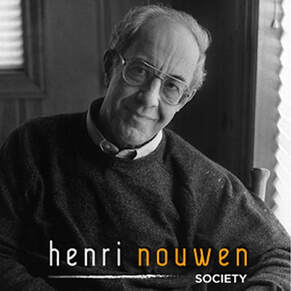 If you are a frequent reader, you know that I often share the wisdom of Henri Nouwen. If you do not know him, here's some things you might find interesting. Henri was a Catholic priest and brilliant scholar who taught at Yale, Harvard, and of course Notre Dame. After spending 20 years in academia, Nouwen went on to work alongside with Jean Vanier and L'Arche, community with individuals who had different intellectual and physical abilities. As Robert A. Jonas explains: "Henri had always wondered what a Eucharistically centered community would be like, and now he had found one at L'Arche." Nouwen wrote 39 books on spirituality (many of which I quote from here) and has sold over 8 million copies and published in 28 different languages. He himself spoke and wrote fluently in English, Dutch, German, French and Spanish. On his trust website they had this to say: Nouwen ranks as one of the most significant spiritual leaders of our time. Nouwen was a priest, academic, psychologist, teacher, author, gifted public speaker, spiritual member, faithful correspondent and friend, wounded healer and a passionate seeker. With an uncanny ease he moved in and out of these different roles, never allowing himself to be fully contained or categorized. In so doing he showed, and continues to show, a generation of ministers, teachers and seekers how one’s gifts are to be placed at the service of those whom God places in our path. Nouwen was a spiritual thinker, a synthesis and one of the first in our time, along with Thomas Merton, to consciously develop a “theology of the heart” and to lay this down as a template for both clergy and lay persons. I often add his words to my blog for personal purposes. When I need inspiration or while I'm looking up something, I often come across these little gems which always make me stop and think. I hope that you too find them and use them to deepen your spiritual journey. His words may be grounded in Christian and Catholic faith traditions, but I believe they have universal appeal. I hope you do to. Nouwen believed that what is most personal is most universal; he wrote, “By giving words to these intimate experiences I can make my life available to others.” Today I give them to you. To watch a documentary on his life, you can find it on YouTube: https://youtu.be/0U8M1gx5Rk4
|
Ian MacdonaldAn ex-copywriter turned punk rock pastor and peacemaker who dedicates his life to making the world a better place for all humanity. "that they all might be one" ~John 17:21“Prius vita quam doctrina.”
~ St. Thomas Aquinas (1225–1274) * “Life is more important than doctrine.”
Archives
June 2024
|

